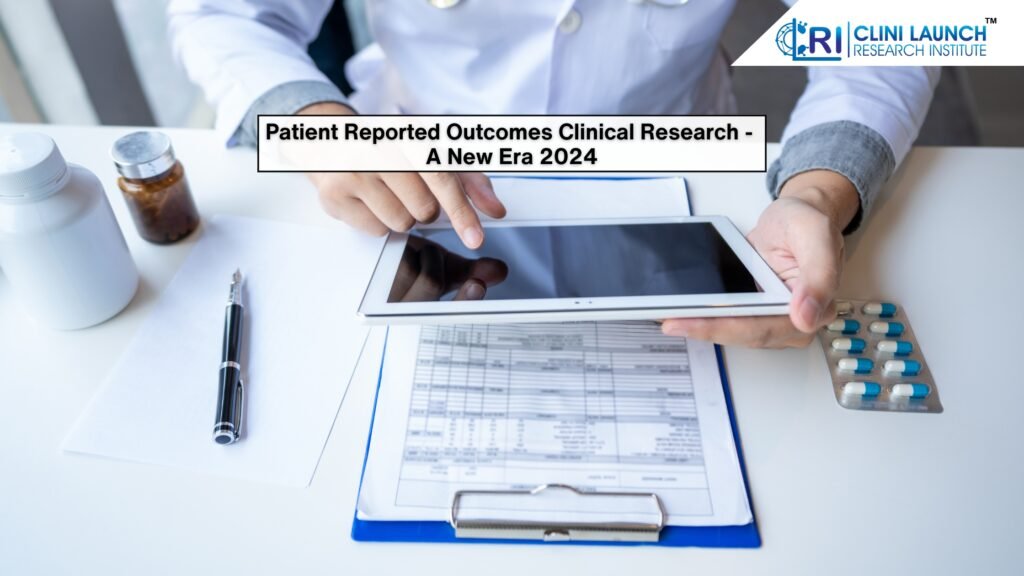Clinical research in the past has mostly depended on clinician-reported outcomes (CROs), which emphasize objective metrics like vital signs, test results, and imaging scans. Although these data points are useful, they frequently exclude an important component: the viewpoint of the patient. This disparity underscores the importance of patient reported outcomes clinical research in medical studies.
Patient-reported outcomes (PROs) record how a patient feels about their health and how their therapy affects their day-to-day activities. They cover a broad spectrum of elements, such as functional limits, quality of life, symptoms, and general well-being. Researchers can make better decisions regarding patient care by gaining a more comprehensive picture of therapy success with the integration of patient input obtained through PROs.
CliniLaunch, a leading research institute offering courses in Clinical Research, Biostatistics, and AI & ML in Healthcare, recognizes the significance of PROs. Their courses equip researchers with the skills necessary to design and implement studies that effectively integrate PRO measurement, leading to advancements in clinical research and improved patient outcomes.
This blog article examines the shortcomings of conventional research techniques and the potential for transformation that comes with using PROs. We’ll talk about how PROs strengthen the role of patient feedback in clinical trials, improve PROs measurement in healthcare research, and eventually open the door to more patient-centred care and better treatment choices.
Traditional Clinical Research: The Imperative for Patient Reported Outcomes The Limitations

Traditional clinical research has historically relied heavily on clinician-reported outcomes (CROs) to assess the efficacy and safety of medical interventions. While CROs provide valuable objective data, they offer an incomplete picture of a patient’s experience. This overreliance on CROs has several critical limitations that underscore the importance of PROs in medical studies.
Firstly, CROs often fail to capture the nuanced impact of a treatment on a patient’s quality of life. Objective measures such as blood pressure or tumour size may improve, but patients may concurrently experience debilitating side effects that significantly diminish their overall well-being. PROs measurement in healthcare research is essential to address this gap and provide a more comprehensive assessment of treatment outcomes.
Secondly, the role of patient feedback in clinical trials is paramount in mitigating potential biases inherent in CROs. Clinicians may inadvertently interpret objective data through the lens of their preconceptions or expectations. By incorporating PROs, researchers can obtain a direct and unfiltered perspective from patients, reducing the likelihood of biased interpretations.
In conclusion, the limitations of traditional research methodologies necessitate a paradigm shift towards a patient-centric approach. By incorporating patient reported outcomes clinical research can generate more accurate, reliable, and meaningful data, ultimately leading to improved patient care and more effective treatment decisions.
Patient Reported Outcomes Clinical Research – The Pivotal Role

Patient reported outcomes (PROs) have emerged as a cornerstone in contemporary clinical research, complementing traditional clinical endpoints. By directly capturing the patient’s perspective on their health and well-being, PROs provide invaluable insights that enhance the importance of PROs in medical studies. This shift towards a patient-centric approach underscores the role of patient feedback in clinical trials and revolutionizes PROs measurement in healthcare research.
PROs encompass a diverse range of patient-generated data, including symptoms, functional status, and quality of life. These self-reported measures offer a holistic view of a patient’s experience with a disease or treatment, transcending the limitations of clinician-reported outcomes (CROs). By incorporating PROs into clinical research, investigators can gain a deeper understanding of treatment efficacy, safety, and tolerability from the patient’s standpoint.
The integration of PROs into clinical trials is paramount for several reasons. Firstly, PROs provide a direct measure of a patient’s health-related quality of life, a critical outcome for many diseases and treatments. By quantifying the impact of interventions on patients’ daily lives, PROs enable researchers to assess the overall benefit-risk profile of therapeutic options. Secondly, PROs can help identify patient-reported symptoms or adverse events that may not be apparent through traditional clinical assessments. This information is essential for optimizing treatment strategies and ensuring patient safety.
Moreover, PROs play a pivotal role in drug development and regulatory decision-making. By demonstrating the impact of treatments on patients’ lives, PROs can strengthen the evidence base for drug approval and labelling. Additionally, PROs can inform comparative effectiveness research by providing real-world data on patient outcomes.
Patient Reported Outcomes Clinical Research – The Big Impact

Patient reported outcomes (PROs) are a game-changer in clinical research, offering a window into the patient’s experience that traditional, clinician-reported outcomes (CROs) often miss. While CROs provide valuable data on objective measures like vitals and lab results, they don’t capture the complete picture of a patient’s journey. PROs, on the other hand, empower patients to share their experiences with symptoms, quality of life, functional limitations, and overall well-being. This rich tapestry of information plays a crucial role in patient feedback in clinical trials, enhancing PROs measurement in healthcare research, and ultimately leading to better treatment decisions and improved patient care.
There are various types of PROs used in clinical research, each designed to capture a specific aspect of the patient’s experience. Some common examples include:
- Symptom-specific PROs: These measures assess the severity and frequency of specific symptoms related to the disease or treatment. (e.g., a pain scale for arthritis patients)
- Functional status PROs: These instruments evaluate a patient’s ability to perform daily activities, highlighting the impact of the condition or treatment on their functional independence. (e.g., a questionnaire on daily activities for stroke patients)
- Quality of life (QoL) PROs: These measures assess the overall impact of the disease or treatment on a patient’s well-being, encompassing physical, mental, emotional, and social domains. (e.g., a generic QoL questionnaire)
By incorporating PROs into clinical trials, researchers gain a deeper understanding of treatment efficacy and safety. PROs can reveal how treatments influence a patient’s ability to manage daily tasks, experience side effects, and maintain a good quality of life. This comprehensive data can be used to compare different treatment options and identify the most effective approach for improving patient outcomes.
The Benefits of Incorporating Patient Reported Outcomes (PROs) in Clinical Research
The integration of patient reported outcomes (PROs) into clinical research offers substantial advantages across multiple facets of healthcare. By capturing the patient’s perspective on their health and treatment, PROs significantly enhance the role of patient feedback in clinical trials.
For patients, PROs empower them to actively participate in their healthcare journey. By providing insights into their symptoms, quality of life, and functional status, patients contribute meaningfully to the research process. This engagement fosters a sense of ownership and can improve treatment adherence. Moreover, PROs facilitate personalized care by tailoring treatment plans based on individual patient experiences.
Researchers benefit immensely from the rich data provided by PROs. These outcomes offer a comprehensive view of treatment efficacy and safety, complementing traditional clinical endpoints. By understanding the impact of interventions on patients’ daily lives, researchers can identify areas for improvement, accelerate drug development, and optimize resource allocation. The inclusion of PROs in clinical trials can ultimately lead to more effective and cost-efficient research.
Furthermore, the importance of PROs in medical studies extends to the realm of personalized medicine. By collecting detailed patient-reported data, researchers can identify patient subgroups with specific characteristics and tailor treatments accordingly. This precision medicine approach holds the potential to revolutionize healthcare by providing optimal care for individual patients.
CliniLaunch’s whitepaper, “The Business Case for PROs: How Patient Reported Outcomes are Revolutionizing Healthcare,” delves deeper into the economic implications of PROs for the healthcare industry. This resource underscores the substantial return on investment associated with implementing robust PRO measurement strategies.
In conclusion, the incorporation of patient reported outcomes into clinical research is imperative for advancing patient care, optimizing research efficiency, and realizing the promise of personalized medicine. By prioritizing the patient’s voice, healthcare stakeholders can drive innovation and improve health outcomes for all.
The Future of Patient-Reported Outcomes in Clinical Research
The evolution of patient reported outcomes (PROs) is ushering in a new era for clinical research. Advances in technology have facilitated the emergence of electronic PROs (ePROs) and patient-reported electronic data capture (PRED) systems, revolutionizing the way patient feedback is collected and analyzed. These innovations enhance the efficiency and precision of PROs measurement in healthcare research.
Central to the future of PROs is their potential to inform real-world evidence (RWE) generation. By capturing patient experiences beyond the confines of clinical trials, PROs offer invaluable insights into treatment effectiveness and safety in routine care settings. This shift towards real-world data emphasizes the critical importance of PROs in medical studies.
To fully realize the benefits of PROs, standardization of measurement instruments and robust data-sharing practices are imperative. By establishing common metrics and facilitating data exchange, researchers can enhance the comparability and generalizability of PRO findings.
As the field of patient reported outcomes clinical research continues to mature, there is a growing demand for skilled professionals who can effectively leverage PROs to drive advancements in healthcare. By acquiring expertise in PRO methodology, data analysis, and interpretation, researchers can contribute to the development of more patient-centered and effective treatments.
The Pivotal Role of Patient Reported Outcomes (PROs) in Clinical Research
Patient reported outcomes (PROs) are revolutionizing clinical research. By capturing the patient’s perspective, PROs enhance the importance of medical studies and the role of patient feedback in clinical trials. CliniLaunch, a leading research institute offering Clinical Research courses, recognizes this value. Their programs equip researchers with the skills to effectively integrate PROs, leading to improved PROs measurement in healthcare research and ultimately, better patient outcomes.

Krishna Talreja
Dynamic content marketing professional with expertise in brand storytelling and strategic content creation. Adept at managing diverse content projects, driving engagement, and enhancing brand visibility across multiple platforms.






Heүa i am for the first time here. I came across this board
and I find It really useful & it helped me out much.
I hope to give something bаck and aid others like
you aided me.
I don’t think the title of your article matches the content lol. Just kidding, mainly because I had some doubts after reading the article.
I don’t think the title of your article matches the content lol. Just kidding, mainly because I had some doubts after reading the article.